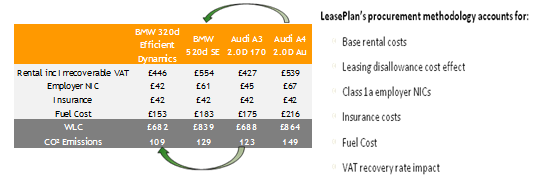There is an alarming increase in operational fleet expenditure, and as our recent publication highlighted, taxation and fuel costs are set to rise substantially in the foreseeable future painting a very disconcerting forecast for decision makers.
Yet, there are various examples and substantiated case studies that have proven that by adopting a strategic approach to managing fleet, companies can indeed mitigate and in most instances reduce their overall fleet expenditure without reducing the benefit level.
Traditional procurement & management models focus predominantly on the finance and maintenance elements of fleet, but as the above breakdown indicates – there needs to be concerted focus on all cost aspects when formalising a fleet procurement strategy.
Traditional procurement & management models focus predominantly on the finance and maintenance elements of fleet, but as the above breakdown indicates – there needs to be concerted focus on all cost aspects when formalising a fleet procurement strategy.
With fuel, national insurance, VAT and Corporation tax recovery rates all directly related to the carbon efficiency of your fleet – surely then the procurement model should at the very least incorporate all factors when deciding what is being offered to employees.
Working with our portfolio of clients, we have developed a costing/procurement methodology which incorporates all knows cost factors. The benefit of this approach has not only been proven in terms of cost reduction, but due to the positive CO2 enhancements made by premium manufacturer brands it is allowing our clients to also improve the selection of vehicles offered.
The net effect from adopting the aforementioned methodology has been as follows:-
• Since 2008 our clients’ average fuel costs have only increased by 1.11%, even though fuel has increased by more than 15% in the past year alone. This was done by introducing more fuel efficient vehicles and working with clients to manage driving behaviour. The average vehicle ordered in 2011 delivers >55miles per gallon, whereas in 2008 the average was below 44miles per gallon
• Since 2008 our clients have managed to contain Class 1 A National Insurance Increases by reducing their average fleet emissions from 154g/km down to 125g/km
• In the same token we have managed to reduce finance costs by motivating more client’s/drivers to drive sub 110g/km vehicles, resulting in 100% writing down allowance in the first year of depreciation
The net effect from adopting the aforementioned methodology has been as follows:-
• Since 2008 our clients’ average fuel costs have only increased by 1.11%, even though fuel has increased by more than 15% in the past year alone. This was done by introducing more fuel efficient vehicles and working with clients to manage driving behaviour. The average vehicle ordered in 2011 delivers >55miles per gallon, whereas in 2008 the average was below 44miles per gallon
• Since 2008 our clients have managed to contain Class 1 A National Insurance Increases by reducing their average fleet emissions from 154g/km down to 125g/km
• In the same token we have managed to reduce finance costs by motivating more client’s/drivers to drive sub 110g/km vehicles, resulting in 100% writing down allowance in the first year of depreciation
The above are but a portion of the considerations that need to be incorporated in your fleet strategy and there are various other proven methods to manage operational expenditure.
In our last publication leading up to the CFO forum we will focus on other solutions that could be considered, including the introduction of company car salary sacrifice programmes to reduce employer national insurance costs, improve your company’s environmental credentials and enhance your employee benefit package.
We look forward to speaking with you at the forum and reiterate our commitment made in terms of a free high-level fleet review to interested companies.
We look forward to speaking with you at the forum and reiterate our commitment made in terms of a free high-level fleet review to interested companies.
Lesley Slater
LeasePlan Brand Director
LeasePlan Brand Director
This post first appeared on the CFO Forum Blog on 02.06.11


No comments:
Post a Comment